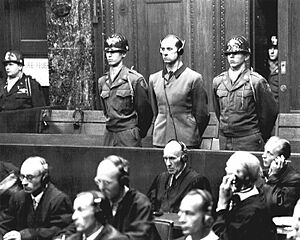Ernst Rüdin facts for kids
Quick facts for kids
Ernst Rüdin
|
|
|---|---|
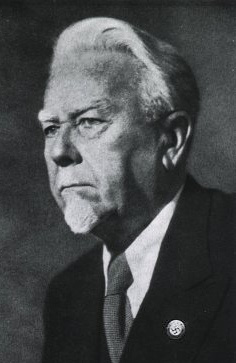
Rüdin in 1944
|
|
| Born | 19 April 1874 St. Gallen, Switzerland
|
| Died | 22 October 1952 (aged 78) |
| Education | Burghölzli (prison), Zürich |
| Political party | Nazi Party (1937–1945) |
| Awards | Goethe medal for art and science; Nazi eagle medal (Adlerschild des Deutschen Reiches), |
| Scientific career | |
| Fields | Psychiatry, genetics, eugenics |
| Institutions | Moabit (prison), Berlin; University of Munich; University of Basel |
| Patrons | Wilhelm Frick |
| Thesis | Über die klinischen Formen der Gefängnisspsychosen (On the clinical forms of prison psychosis) |
| Doctoral advisor | Eugen Bleuler |
| Other academic advisors | Emil Kraepelin |
Ernst Rüdin (born April 19, 1874 – died October 22, 1952) was a doctor from Switzerland. He became a leading expert in psychiatry, which is the study of mental health. He also studied genetics, which is about how traits are passed down in families.
Rüdin was a strong supporter of eugenics. This was a harmful idea that aimed to "improve" the human race by controlling who could have children. He became very important in Germany, especially during the time of the Nazi Party.
Contents
Early Life and Studies
Ernst Rüdin was born in St. Gallen, Switzerland, in 1874. His father was a textile salesman. From 1893 to 1898, he studied medicine in many cities. These included Geneva, Lausanne, Berlin, and Zürich.
In 1899, Rüdin worked in Zürich with a psychiatrist named Eugen Bleuler. Bleuler was famous for coining the word schizophrenia. After finishing his PhD, Rüdin worked at a prison in Berlin.
Working with Emil Kraepelin
In 1907, Rüdin moved to Munich to work with Emil Kraepelin. Kraepelin was a very important psychiatrist. He helped create the modern way of classifying mental illnesses. Many people see him as the father of modern psychiatric classification.
Kraepelin and Rüdin believed that the German people were becoming weaker. They thought this led to more mental illnesses. Fears about people "degenerating" were common back then. But Rüdin took these ideas to an extreme level.
He always tried to turn his research into political actions. He also often talked about how expensive it was to care for sick and disabled people.
Ideas about Genetics
Rüdin studied how mental disorders might be passed down through families. He published his findings on the genetics of schizophrenia in 1916. He thought that just a few genes caused these conditions.
However, his own studies did not fully support his theories. For example, his research on mood disorders showed that the environment also played a role. But he chose not to publish this information. Even so, Rüdin was known for his advanced research methods. He is still called "the father of psychiatric genetics" by some.
Racial Hygiene Ideas
Rüdin was influenced by his friend Alfred Ploetz. Ploetz created the term "racial hygiene" in 1895. This was a form of eugenics, based on social darwinism. It was a popular idea in many countries at the time.
Rüdin strongly supported these ideas early in his career. In 1904, he became an editor for a journal about racial hygiene. In 1905, he helped start the German Society for Racial Hygiene. In 1910, he wrote that medical care for people with mental illness or other conditions went against natural selection. He believed medicine should help "clean" the human gene pool.
Growing Influence
In 1917, a new research center was opened in Munich. It was called the German Institute for Psychiatric Research. Emil Kraepelin helped create it. The Institute had a special department for studying family history and population. This was the first in the world to focus on psychiatric genetics. Rüdin was put in charge of this department.
In 1924, the Institute became part of the famous Kaiser Wilhelm Society. Rüdin left for a few years to work in Switzerland. He returned to the Institute in 1928. His department got more money and a new building. This money mainly came from the American Rockefeller Foundation. The Institute became a leading center for psychiatric research.
In 1931, after Kraepelin died, Rüdin became the director of the entire Institute. He also remained head of his department.
Spreading Harmful Ideas
Rüdin was one of the first to write about the "dangers" of people with inherited problems. He also wrote about the supposed value of the "Nordic race". By 1920, his colleague Alfred Hoche published a harmful idea. It was called "Allowing the Destruction of Life Unworthy of Living."
In 1930, Rüdin represented Germany at a big meeting in the US. He argued for eugenics there. In 1932, he became the president of a group called the International Federation of Eugenics Organizations. He also had contact with the British Eugenics Society.
From 1935 to 1945, he was president of a society for German neurologists and psychiatrists. The American Rockefeller Foundation continued to fund researchers at Rüdin's department. This happened even as late as 1939. Many important figures in psychiatric genetics visited his lab.
The Nazi Party also supported Rüdin's research. They provided people and money.
Nazi Expert
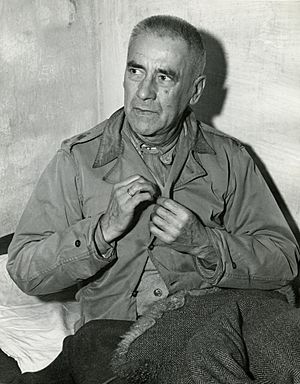
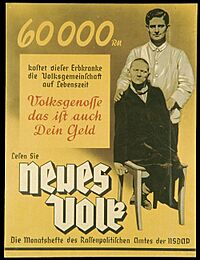
In 1933, Ernst Rüdin and other experts on racial hygiene joined a committee. This committee advised the Reich Interior Minister Wilhelm Frick. Their ideas were used to support the racial policy of Nazi Germany. A law called the "Law for the Prevention of Hereditarily Diseased Offspring" was passed in 1934. This law forced people with certain conditions to be sterilized, meaning they could not have children.
In a speech in 1934, Rüdin said that the importance of racial hygiene became clear only with Adolf Hitler's actions. He said that Hitler made their "30-year-long dream" of putting racial hygiene into practice come true. Rüdin called it a "duty of honor" to help carry out Nazi policies. He declared that people who were not "fit" should not have children. He believed the state should make sure only "fit" people had children.
Rüdin had always been a strong believer in the "purity" of the German people. Some described him as a "fanatical geneticist" rather than just a fanatical Nazi. His ideas for reducing cases of schizophrenia did not work.
Rüdin joined the Nazi Party in 1937. In 1939, Hitler personally gave him a 'Goethe medal'. Hitler called him a "pioneer" of the racial hygiene measures of the Third Reich. In 1944, he received another medal from Hitler. Hitler called him a "pathfinder in the field of hereditary hygiene."
After the War
After World War II ended in 1945, Rüdin said he had only done academic science. He claimed he hated the Nazis. However, his Nazi political activities and the awards he received from Hitler were soon discovered. An investigative journalist concluded that Rüdin was "one of the most evil men in Germany."
In 1945, Rüdin lost his Swiss citizenship. He was then placed under house arrest by the military government in Munich. However, he was released in 1947 after a "denazification" trial. He was supported by former colleagues like Franz Josef Kallmann and physicist Max Planck. His only punishment was a 500 Reichsmark fine.
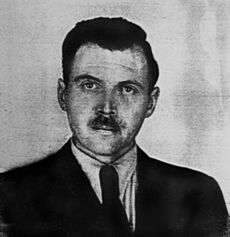
Many wondered why he was released so early. He had been considered a possible defendant for the Nuremberg trials. Some reasons might include the need to rebuild trust in the German medical field. Also, he had connections to important American and British researchers. He also often used American eugenics programs to justify his own actions.
Despite his release, Rüdin is seen by some as a more important planner of Nazi crimes than doctors like Karl Brandt or Josef Mengele. Mengele, who was infamous, had even attended Rüdin's lectures.
After Rüdin died in 1952, a close friend gave his funeral speech. This friend was Kurt Pohlisch, who had also been a Nazi advisor.
Rüdin's connections to the Nazis caused many criticisms of psychiatric genetics in Germany after 1945. His daughter, Edith Zerbin-Rüdin, also became a psychiatric geneticist.
See also
- Ethnic cleansing
- Eugenics
- Nazi doctors (list)
- Racial hygiene
- Werner Heyde
- Werner Villinger
- Alfred Ploetz
 | Aaron Henry |
 | T. R. M. Howard |
 | Jesse Jackson |


